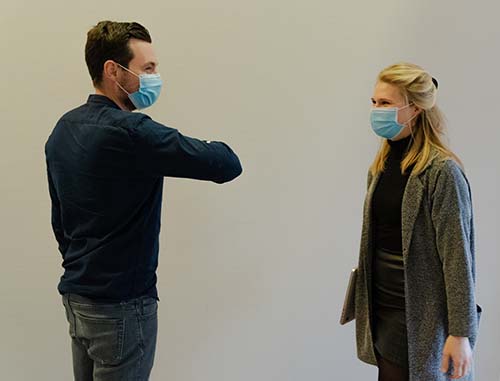Technology as a Poverty Fighting Tool

February 15, 2021
“Ultimately, technology is neither good nor bad on its own. It’s a tool, and what matters is how we use it. It’s up to businesses, nonprofits and governments to … get practical. Instead of wondering and waiting to see what the impact of technological change will be, they can guide it.” – Melinda Gates
Technology is everywhere … increasing access to information, health care, education, sustainable energy, transportation and more. At The Fedcap Group we believe that by effectively leveraging technology as a poverty fighting tool, we can exponentially increase our impact. Over the past decade we have invested significant time and resources to create innovative technological platforms that are reaching more people, changing more lives.
In 2012 we developed Get Ready!, a web-based platform to help youth in foster care enter and succeed in college. In 2015 with the support of the Hilton Foundation, we developed PrepNOW!, a complimentary web-based tool to assist foster parents in developing a college-going culture in their homes. These investments continue to pay off as we work to improve the long-term outcomes for youth transitioning from foster care. In 2015, we initiated the development of FedcapCARES, focused on supporting individuals on public assistance to obtain and retain employment. We continue to invest in this platform, systematically expanding it across our footprint. In 2017, we combined with Single Stop, a nonprofit that developed a powerful technological tool to help people break the cycle of poverty.
For nonprofit agencies, technology offers a tremendous opportunity to significantly expand our reach. Below, I have described the impact one of our technology solutions is having on people struggling to make ends meet.
Most individuals in the helping profession know that the number one challenge for people in need, is finding available resources. The social service “system” is a maze of rules and regulations, paperwork and confusion. And when people are hungry, have no transportation, or are homeless, the barriers to getting help can seem insurmountable. Michael Weinstein, who holds a Ph.D. in Economics from MIT, knew that. Twenty years ago, he started a program in the basement of a church in a low income neighborhood in West Philadelphia. The goal—to leverage technology and community—creating a single stop for people to get the help they need, in a location they regularly frequent. In 2001, as the Sr. Vice President for the Robin Hood Foundation, he brought the idea to New York City, and through partnerships with organizations in communities where New Yorkers are struggling financially, Single Stop was launched.
Simply put, Single Stop is a technology-based solution to help individuals access the supports they need to meet their basic needs, i.e., food stamps, housing assistance, tax credits, health care subsidies—and more. By entering key personal data into the Single Stop system, people can learn what they are eligible for and where and how to access the resources. In 2006, Single Stop had evolved into one of the nation’s largest and most successful anti-poverty efforts. To date, Single Stop has served over 2 million households across a ten-state footprint and helped families draw down over $6.5 billion dollars in critically needed resources.
Single Stop is also making a difference on college campuses. Poverty persists across this country–in neighborhoods, in rural and urban areas and on college campuses. A report by the Hope Center for College, Community, and Justice, College and University Basic Needs Insecurity, found that overall, 70 percent of students at two-year institutions and 61 percent of students at four-year institutions faced either homelessness, housing or food insecurity in the previous year. Bottom line–a significant number of students on our college campuses across the country are going to class hungry, and just $200-300 can mean the difference between students staying in college or not. In 2009 Single Stop became available as a resource to students on a growing number of college campuses. In the past 11 years, Single Stop has provided services to 269,272 students, helping each student, on average, draw down $3,300 in resources and tax credits, offsetting the cost of food and housing. In total, Single Stop has helped students draw down $548 million dollars in resources. And these resources are making a difference.
Single Stop’s college program has been evaluated by RAND Corporation and Metis Associates. These studies demonstrate that students who access Single Stop are more successful in college than their peers who do not utilize the organization’s services: Single Stop users were 6 percent to 11 percent more likely to persist into their next year of college.
In addition, students who use Single Stop are more likely to attempt more college credits, giving them a boost in completing their college programs. Single Stop has received two White House Social Innovation Fund Grant awards, enabling an expansion of its work on college campuses.
The Fedcap Group continues to invest in Single Stop, increasing its functionality and the ease of user interface. This is just one example of how, when designed thoughtfully and distributed effectively, technology can be a tremendous asset in the fight to eradicate poverty and lift people to economic well-being.
As always, I welcome your thoughts.
La Tecnología Como Herramienta Para Combatir La Pobreza
February 15, 2021
“Básicamente, la tecnología no es buena ni mala por sí misma. Es una herramienta, y lo que importa es cómo la usemos. Depende de las empresas, las organizaciones sin fines de lucro y los gobiernos … ser prácticos. En lugar de estarse preguntando y esperando a ver cuál será el impacto del cambio tecnológico, para que puedan guiarlo.” – Melinda Gates
La tecnología está en todas partes… aumentando el acceso a la información, a la atención de la salud, a la educación, a la energía sostenible, al transporte y más. En The Fedcap Group creemos que, al aprovechar eficazmente la tecnología como herramienta de lucha contra la pobreza, podemos aumentar potencialmente nuestro impacto. Durante la última década hemos invertido mucho tiempo y recursos para crear plataformas tecnológicas innovadoras que están llegando a más personas; cambiando más vidas.
¡En 2012 desarrollamos “Get Ready!”, una plataforma basada en la en la red para ayudar a los jóvenes en el cuidado de crianza; a entrar y tener éxito en la universidad. ¡En 2015 con el apoyo de la Fundación Hilton, desarrollamos “PrepNOW!”, una herramienta gratuita basada en la red para ayudar a los padres adoptivos; en el desarrollo de una cultura universitaria en sus hogares. Estas inversiones siguen dando sus frutos a medida que trabajamos para mejorar los resultados a largo plazo, en la transición de los jóvenes en el cuidado de crianza. En 2015, iniciamos el desarrollo de “FedcapCARES”, enfocado en apoyar a las personas en asistencia pública para obtener y retener empleo. Seguimos invirtiendo en esta plataforma, expandiéndola sistemáticamente a través de toda nuestra presencia. En 2017, se nos incorporó Single Stop, una organización sin fines de lucro que desarrolló una poderosa herramienta tecnológica para ayudar a las personas a romper el ciclo de la pobreza.
Para las agencias de sin fines de lucro; la tecnología ofrece una tremenda oportunidad para expandir significativamente nuestro alcance. A continuación, he descrito el impacto que una de nuestras soluciones tecnológicas está teniendo en las personas que luchan para hacer que dinero alcance para el fin del mes.
La mayoría de las personas en la profesión de asistencia, saben que el desafío número uno para las personas necesitadas; es encontrar los recursos disponibles. El “sistema” de servicio social, es un laberinto de reglas y regulaciones, papeleo y confusión. Y cuando la gente tiene hambre, o no tiene transporte o está sin hogar, las barreras para obtener ayuda pueden parecer insuperables. Michael Weinstein, que tiene un doctorado en Economía del “MIT”, lo sabía. Hace veinte años, comenzó un programa en el sótano de una iglesia en un barrio de escasos recursos, en el Oeste de Filadelfia. El objetivo: aprovechar la tecnología y la comunidad; creando una Single Stop, para que las personas recibieran la ayuda que necesitaban, en un lugar que regularmente frecuentaban. En 2001, cuando el Sr. vicepresidente de la Fundación Robin Hood, trajo la idea a la ciudad de Nueva York, y a través de alianzas con organizaciones en comunidades donde los neoyorquinos estaban teniendo problemas financieros; Single Stop fue lanzada.
Dicho simplemente, Single Stop es una solución basada en la tecnología para ayudar a las personas a acceder a los apoyos que necesiten para satisfacer sus necesidades básicas; es decir: cupones de comida, asistencia de alojamiento, créditos fiscales, subsidios de atención médica y más. Al meter datos personales clave en el sistema de Single Stop; las personas pueden saber para qué son elegibles; dónde y cómo acceder a los recursos. En 2006, Single Stop se había convertido en uno de los esfuerzos contra la pobreza más grandes y exitosos del país. Hasta la fecha, Single Stop ha servido a más de 2 millones de hogares en una presencia de diez estados y ha ayudado a las familias a recibir más de 6.500 millones de dólares en recursos de vital importancia.
Single Stop también está haciendo la diferencia en los recintos universitarios. La pobreza persiste en todo este país; en los barrios, en las zonas rurales y urbanas y en los recintos universitarios. Un informe del “Hope Center for College, Community, and Justice, College and University Basic Needs Insecurity”; encontró que, en total, el 70 por ciento de los estudiantes en instituciones de dos años y el 61 por ciento de los estudiantes de instituciones de cuatro años se enfrentaban a la miseria, a la vivienda o a la inseguridad alimenticia en el año previo. En resumen: un número significativo de estudiantes en nuestros recintos universitarios en todo el país van a clase con hambre, y solo unos $200-300 dólares pueden hacer la diferencia entre los estudiantes que permanecen en la universidad y los que no. En 2009 Single Stop estuvo disponible como un recurso para los estudiantes en un número creciente de recintos universitarios. En los últimos 11 años, Single Stop ha proporcionado servicios a 269,272 estudiantes, ayudando a cada estudiante, en promedio, a obtener unos $3,300 dólares en recursos y créditos fiscales; compensando el costo de alimentos y vivienda. En total, Single Stop ha ayudado a los estudiantes a obtener $548 millones de dólares en recursos. Y estos recursos están haciendo la diferencia.
El programa de Single Stop con las universidades ha sido evaluado por “RAND Corporation y Metis Associates”. Estos estudios demuestran que los estudiantes que acceden a Single Stop tienen más éxito en la universidad que sus compañeros que no utilizan los servicios de la organización: los usuarios de Single Stop tenían entre un 6 o un 11 por ciento más probabilidades de persistir en su próximo año de universidad. Además, los estudiantes que usan Single Stop están más propensos a obtener más créditos universitarios; dándoles un impulso en la terminación de sus programas universitarios. Single Stop ha recibido dos concesiones del “White House Social Innovation Fund Grant”, permitiéndole una expansión de su trabajo en los recintos universitarios.
The Fedcap Group continúa invirtiendo en Single Stop; aumentando su funcionalidad y la facilidad de interconexión del usuario. Este es sólo un ejemplo de cómo; cuándo se diseña cuidadosamente y se distribuye eficazmente; la tecnología puede ser un tremendo recurso en la lucha para erradicar la pobreza y llevar a las personas al bienestar económico.
Como siempre, espero con ansia sus opiniones.









